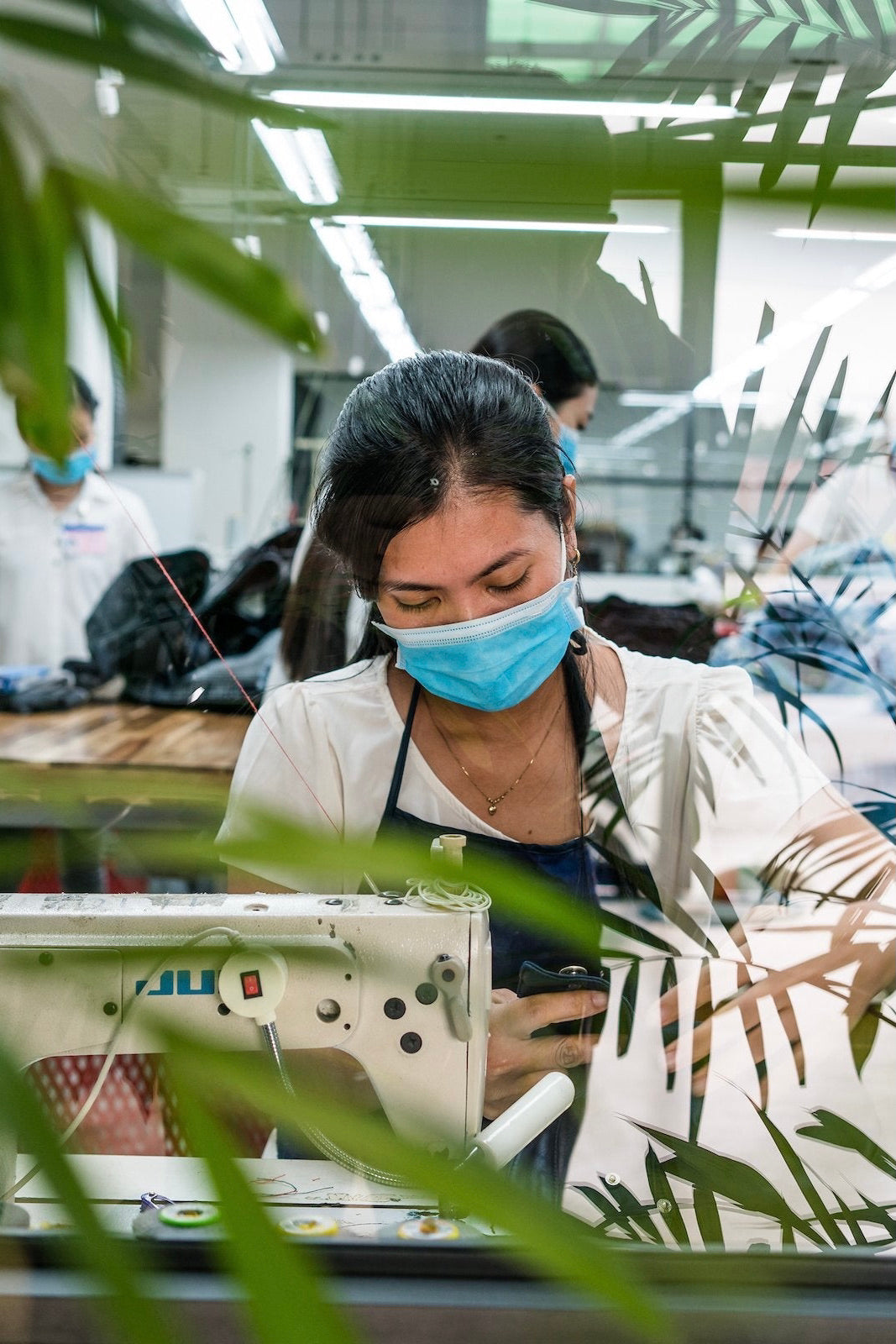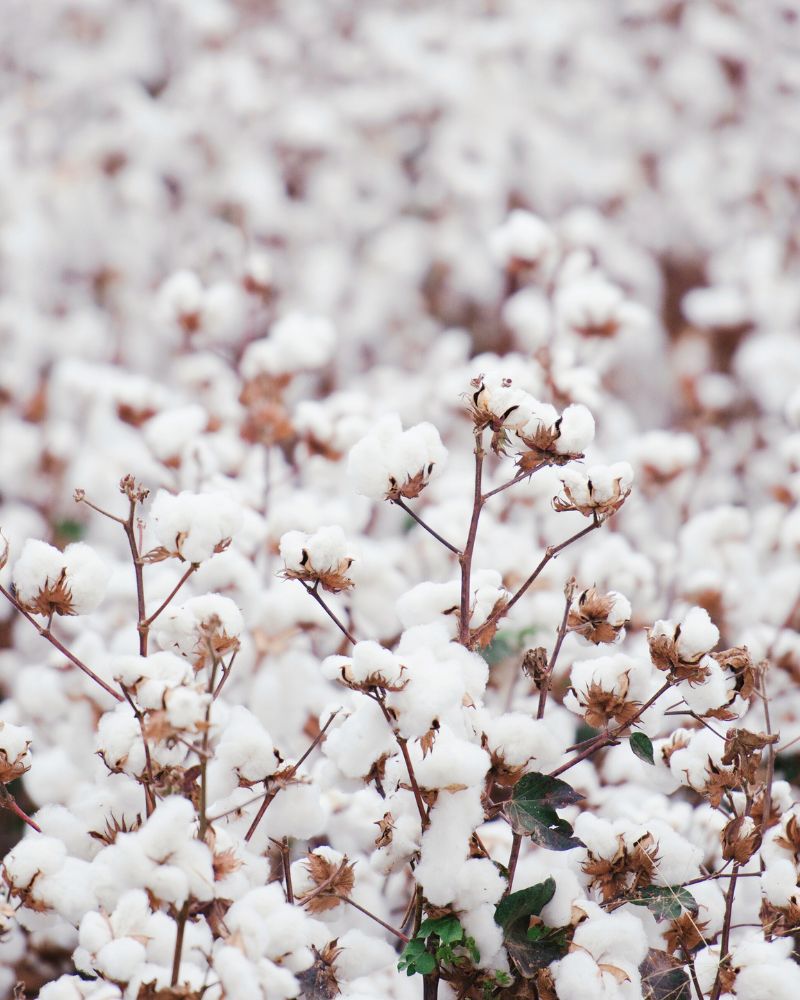What we're doing differently

THE PROBLEM
The fashion industry is known for modern slavery, toxic dyes in rivers, a huge amount of waste and poor wages for garment workers.
Nobody wants that.
But £80 for a sustainable T-shirt?! Nobody wants that either.
And not buying clothes isn’t an option either (nobody wants to see that).
So we started Yes Friends to make ethical clothing affordable and transform the fashion industry.

Image ©️ Evolution3
If Yes Friends did a PhD. This would be our thesis.
THE DEEP DIVE
-
The Yes Friends Bonus
We run a pioneering bonus scheme for garment workers, to ensure they receive a good wage. It's why we do what we do.For Yes Friends garments, we pay an additional bonus directly to the garment workers. This means they are paid a good wage for every Yes Friends product made.
Did you know? Adding as little as 10p to the price of a T-shirt can increase workers wages by a whopping 50%. Sounds like magic, but it’s just maths. Magic Maths.
The bigger we get, the bigger impact we can have.
P.S. We're also the first UK brand to allow customers to directly tip their garment workers! Check out the feature on our product pages.
Read about the impact the Yes Friends bonus is having here.
How do we calculate the Yes Friends bonus?
Our goal is that every garment worker across the fashion industry is paid a living wage. We've set-up a pioneering bonus scheme to ensure that garment workers are paid a good wage for making Yes Friends clothing.Here's how we calculate the bonus for workers at our primary factory, Fabstract Clothing.
First, we find out what the lowest paid workers wage is. We then calculate how long it takes a worker to knit, cut, sew, wash and pack each of our garments. We then use the Global Living Wage Coalition's (GLWC) definition of a living wage and find their report on the location closest to where Yes Friends is made. We then research any living cost variation between this location and the location of our factory and adjust the GLWC figure accordingly. We also look at what trade union's are asking for, to give an additional reference point, so far the GLWC figure has always been significantly higher.
Using all this information, we look at the difference between the lowest paid workers wage and the GLWC wage and work out how much extra per garment we will need to pay, to pay our part towards a living wage. We then send this bonus to our factory and it is distributed via payroll evenly among the workers at the solar factory where our bulk production takes place.
Currently, on a T-shirt the additional bonus on top of their salary is 27p.
The bigger we get, the bigger impact we can have. We want to gain enough buying power to ensure that all workers receive a living wage.
To find out about how the bonus is calculated on our hoodies, you can read more here. -
Solar Powered Factories
Both our partner factories are solar power assisted, reducing the use of CO2 during production.
Our primary factory in India where all our current range is made (minus hoodies) gets 50% of its energy from solar power and the rest from non-polluting natural gas. They also have a humongous battery so that during power cuts they aren't reliant on polluting diesel generators.
Organic CottonWe only use organic cotton which produces 46% less CO2 than conventional cotton.¹
¹https://www.soilassociation.org/certification/fashion-textiles/benefits-of-organic-certification/ -
We only use organic cotton. It's a win, win, win, win.
One. Organic cotton is primarily rain-fed, reducing the need for water irrigation.¹
Two. Most of our organic cotton is grown, spun, knitted, cut & sewn in India. So it’s not trekking around the world from one factory to another racking up carbon miles.
Three. We don’t use pesky pesticides or toxic chemicals which means happy soil, happy farmers and happy skin.
Four. Oh, and did we mention it feels like you’re wearing a cloud? ⛅️
Fairtrade Cotton
Where we can we also work with Fairtrade cotton to improve the lives of cotton farmers. Look out for the FAIRTRADE Cotton Mark on our product pages.
Fairtrade cotton ensures that all cotton farmers receive the Fairtrade Minimum Price and the Fairtrade Premium (an additional sum of money which goes into a communal fund for workers and farmers to use – as they see fit – to improve their social, economic and environmental conditions).
¹https://store.textileexchange.org/wp-content/uploads/woocommerce_uploads/2019/09/TE-Material-Snapshot_Cotton-Organic.pdf
A little more detail 👇
How much of the Yes Friends collection uses organic cotton?
All of our range is made using organic cotton. Most Yes Friends products use 100% organic cotton. The least amount of organic cotton we use in a product is 95%, which is combined with 5% elastane to give a little stretch.
Are Yes Friends products Fairtrade certified?
The majority of Yes Friends products are made using Fairtrade cotton, lookout for the FAIRTRADE Cotton Mark on our product pages to check if a particular product is made using Fairtrade cotton.
Are Yes Friends products GOTS (Global Organic Textile Standard) certified?
We've always bought organic cotton and our manufacturers are GOTS certified. All of the Yes Friends products have been made to the GOTS standard and in May 2024 we started certifying all new products with the GOTS logo. Lookout for the GOTS logo on our product pages to see which products have the GOTS certification. -
We work with Fairtrade and GOTS certified factories to ensure good labour practices, you can read all about our recent visit to our primary factory (and the wedding of the factory owner's son!) here.
We also have a Supplier Code of Conduct based on the Ethical Trading Intiative's Base Code which you can read here.
-
Our primary* factory in India where Yes Friends knit, cut & sew production takes place is water positive: 100% of water used is processed and recycled through either a reserve osmosis process or at the Effluent Treatment Plant onsite.
They also have a rainwater harvesting system that recharges groundwater.
Organic Cotton
Organic cotton uses significantly less water than conventional cotton and isn't sprayed with toxic chemicals keeping waterways cleaner.¹
*The factory where all of Yes Friends current range is made, minus hoodies.
¹https://www.soilassociation.org/certification/fashion-textiles/benefits-of-organic-certification/ -
All of our collection is dyed using GOTS certified dyes (Global Organic Textile Standard). We work with organic cotton and GOTS certified factories to avoid the use of toxic chemicals in production.
-
Yes Friends exists to make ethical fashion affordable, whilst producing premium quality clothing that'll stand the test of time. A Ferrari for the price of a Fiesta.
Here's how we do it 👇
We buy in big quantities to get the best prices and miss out the retailer, passing the savings straight to you. -
Reduce, reuse, recycle.
Our factories recycle their offcuts from production processes and our primary* factory also use advanced software to make sure there is minimal waste when cutting garments.
The factory where our hoodies were made also send the leftover dye mud to a cement factory to be recycled.
*The factory where all of the Yes Friends current range is made, minus hoodies. -
We do not use animal products in the making of Yes Friends clothing.
-
Who's checking?
We work with a range of industry leading certifications to ensure our ethical credentials. We have also received the highest "Great" rating from independent ethical brand directory Good On You.
Here's some of the certifications and organisations we and our suppliers work with:
Fairtrade Cotton
Fairtrade cotton ensures that all cotton farmers receive the Fairtrade Minimum Price and the Fairtrade Premium (an additional sum of money which goes into a communal fund for workers and farmers to use – as they see fit – to improve their social, economic and environmental conditions). Find out more here.
Our Fairtrade cotton is labelled under the Fairtrade Labelling Organisation (FLO), licence no: FFLC0862
Fair Trade USA
Fair Trade USA audits ensure that working conditions are safe, the environment is protected and workers receive fair pay.
Global Organic Textile Standard (GOTS)
The world leading textile processing standard for organic fibres and ecological impact. This ensures all fibres are grown without any synthetic pesticides and are sustainably produced from farming, harvest, and textile processing. Find out more here.
Fair Wear Foundation
Fair Wear Foundation is an independent, non-profit organisation that works to improve conditions for workers in garment factories. Find out more here.
Business Social Compliance Initiative (BSCI)
BSCI audits ensure accountability for supply chains that all labour is safe, fair, and free from discrimination and forced labour or labour that does not provide sufficient employee bargaining. Find out more here.
Worldwide Responsible Accredited Production (WRAP)
WRAP demonstrates that the facilities obey the laws of the country, treats workers with dignity and respect, and are conscious of the impact the facility has on the environment. Find out more here. -
We are currently working with Fairtrade and GOTS to help trace our supply chain.
When we launch new products, we also have internal discussions with our primary supplier about key additional suppliers they're working with to make Yes Friends clothing e.g. the supplier who makes the recycled waistbands for our boxers.
If you'd like to know more details about the full supply chain for products, then do reach out. We'll either have the information to hand or we can find out what you'd like to know about our mills, screen printers, yarn suppliers etc!
Over the coming years we'd like to find a good way of communicating this information with all of you, so you can see the full Yes Friends supply chain when buying from us. -
From us to you
We use compostable and biodegradable bags made from corn to keep your clothing safe and sound at our warehouse.
We then package up all of your orders here at Yes Friends HQ in Bristol. We put them in our signature flaming hot orange bags made from 30% recycled plastic (they're also 100% recyclable and biodegradable!), ready to keep your clothing safe in transit.
Royal Mail delivers our parcels and has the lowest reported carbon footprint per delivery of the major UK delivery services. We also work with Shopify to ensure all our deliveries to you are carbon neutral, you can read more about this here.
From our factories to the UK
We ship by sea wherever possible to keep our carbon footprint as low as possible.
Sometimes when we need a shipment quickly it is not possible to ship by sea, so we use air freight. We are working on our planning and scheduling to make sure this happens as little as possible.
Our garments arrive in the UK in huge cardboard boxes which we then recycle or reuse to store stock.















